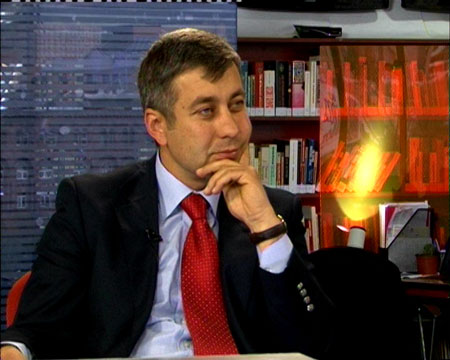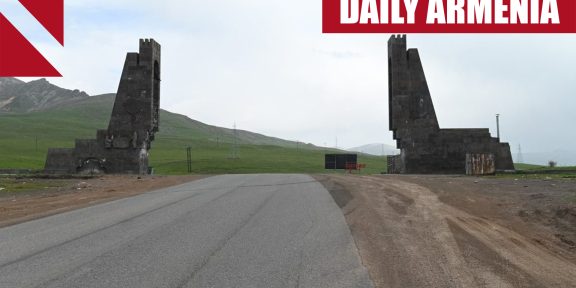 Vladimir Karapetyan, Chairman of the ANC’s Foreign Relations Committee.
Vladimir Karapetyan, Chairman of the ANC’s Foreign Relations Committee.
Armenia is stepping into one of the most important periods of its history since independence. After the adoption of the Constitution in 1995 (amended in 2005), Armenia has chosen a semi-presidential regime, which is considered to be most suitable for a newly independent country. The system also guarantees a complete change of the ruling power because of the ban on the third term in office for the incumbent President. With the intention to circumvent this limitation and apparently intending to prolong his power for an undefined period of time, Serzh Sargsyan decided to introduce a new Constitution, by completely changing the regime of governance.
The opposition party Armenian National Congress issued a statement where it harshly criticized the initiative: “The draft of the new Constitution developed for the reproduction of Serzh Sargsyan and the group of bandits led by him and perpetuation of their power is, in essence, a coup for seizure of power. With the draft, the citizens are offered a system of social political relationships, which contains serious threats to the statehood of Armenia.”
Hearings on the new Constitution will start next week in the National Assembly. It is expected that other political parties will also express their position. However, most of the parties will typically focus on textual changes trying to refrain from serious criticism of the Draft. Meanwhile, Serzh Sargsyan decided to consult about his plans with his counterpart in Moscow.
Sargsyan’s visit to Moscow on September 7 was planned long ago. There is a tradition to highlight the success of the summits by announcing prominent achievements and new programs during meetings. It has been done every time when Sargsyan and Putin have met. This time, however, both sides had nothing new to announce – the official press release looks like the short version of the one that was published on June 26, when Serzh Sargsyan met the Russian Transport Minister Maksim Sokolov, Co-Chairman of the Armenian-Russian Intergovernmental Commission for Economic Cooperation
All of the so-called achievements made public during the summit have already been voiced in June. These include decreasing the price of natural gas (starting from January 1, for one m3 Armenia pays 165 USD instead of the previous 189 USD); the signing of a 200 million USD preferential loan agreement, which will allow Armenia to buy modern armament from Russia; transferring of the criminal proceeding of the criminal case related to the brutal crime committed in Gyumri in January to Armenia’s respective authorities and the conclusion of the Agreement for the Modernization and Extension of the Operation Term of the Armenian Nuclear Power Plant.
There was nothing new announced publicly in the meeting between Sargsyan and Putin, which comes to prove the absence of significant progress in bilateral relations. At the same time there were important topics to discuss as one can read in between the lines of the official reports.
The issue of Constitutional “reforms” fully occupies Armenia’s domestic agenda and interlocutors could hardly avoid a detailed discussion on the issue. The fact that Sargsyan thanked Putin five times during the three-minute footage comes to prove that it is Sargsyan who reported to his Russian colleague about his vision of Constitutional change. In fact the issue is very sensitive, since no country within the Eurasian Economic Union has a parliamentary system, and the precedent is very important for Armenia’s major partner.
One of the most important factors of Constitutional change is the fate of the peace process of the Nagorno-Karabakh conflict. Any outcome of the Armenian referendum will have serious impact on the negotiations – if it fails, the political authority of Sargsyan would be questioned immediately. If Sargsyan succeeds, the peace process would definitely end up in a halt for an additional 2-3 years. It is well known that for achieving tangible results in the settlement of the Nagorno-Karabakh conflict, interlocutors must have unquestioned legitimacy extended for a certain period of time. Then the presidents can ensure the implementation of the agreement.
In a situation when the Prime Minister of Armenia becomes the highest political figure, the credibility of the president as a person responsible for painful and difficult decisions, is compromised. Both, Azeri leadership and OSCE Minsk Group Co-chairs may consider that Serzh Sargsyan may be incapable of holding serious negotiations before the Parliamentary Elections of 2017. And after the elections (May 2017) the National Assembly will elect a Prime Minister who would be the head of state after Sargsyan’s terms as president expires (April 2018). It means that there will be no serious contacts between parties involved in the peace process before 2018. There is a window of opportunity in the first half of 2016 (Parliamentary elections in Azerbaijan will take place in November 2015), however no one would consider it to be enough for achieving serious results.
Hence, initiating the Constitutional changes, Sargsyan plans to halt the negotiations and ultimately eliminate his own personal responsibility for the process.
It goes without saying that the issue of Constitutional changes was among the major issues discussed in Moscow.
Another important topic of discussions relates to the continuous impact of sanctions against the Russian Federation and the corresponding reactions of Moscow and its allies. There is nothing mentioned in the official report, however the next day, media reported about the pending visit of the Crimean leader to Armenia. The controversial Crimean leader is among Russian and pro-Moscow officials under sanctions imposed by the United States and the European Union in response to what the Western powers see as Russian aggression against Ukraine. Official Yerevan refrained from commenting on the possibility of the visit.
Another implication of the bilateral talks could be seen in the unexpected initiative of Armenian Prime Minister voiced during his meeting held in the framework of the Eurasian Economic Union (EEU) in Belarus. Hovik Abrahamyan has proposed that the prices of natural gas and other strategic commodities traded within the EEU will be set in Russian rubles, rather than U.S. dollars.
Abrahamian stressed the need to reduce the high degree of “dollarization” in trade among Russia, Kazakhstan, Belarus, Armenia and Kyrgyzstan. The rational for that proposal is unknown, and has never been discussed in Armenia. Unlike Russia, where the national currency weakened by more than two times, the depreciation of the Armenian dram did not exceed 20 percent.
The coming weeks might bring other developments that could be considered an after-effect of the high level agreements between Armenia and Russia.
Vladimir Karapetyan,Chairman, Foreign Relations Committeeof the Armenian National Congress PartyFormer MFA Spokesperson
















